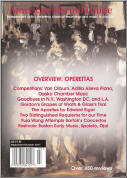Reviewer: Willia,
J. Gatens
The two Bach cantatas on this
recording—54 (Widerstehe doch der Sünde) and 170 (Vergnügte Ruh! Beliebte
Seelenlust!)—are both for solo alto. Here they are vehicles for the
technical brilliance and artistry of countertenor Tim Mead. They come from
different periods in Bach’s career: 54 was written for Weimar in 1714 and
170 for Leipzig in 1726. Mead’s strong and clear tone serve the music well.
With many singers, ornamentation consists of occasional smudges of the vocal
line. Here the ornaments are crisp and unequivocal. Mead’s execution of the
formidable roulades in the second aria of 54 is especially impressive. Mead
teams up with soprano Lucy Crowe for Pergolesi’s Stabat Mater, and she is in
every respect a worthy collaborator. All of the music here is performed one
instrument to a part, giving the performances the flavor of chamber music.
The Bach performances are impressive, but I find the Pergolesi
misfiring at almost every turn. The string tone is rather weedy and frigid,
and the playing is anything but subtle. String accents tend to be hammered.
The continuo ensemble includes a harpsichord, but much of the time the
playing is just too busy, almost giving the impression of radio static. Fast
tempos are grotesquely fast, like a horse race. To their credit, the
vocalists have the technique to keep up, but they shouldn’t have to. This
recording induced me to revisit Robert King’s 1987 recording with Gillian
Fisher and Michael Chance (Hyperion), as their performance is in its forces
essentially the same as the present one: solo voices (no treble choir) and
one-to-a-part period strings with chamber organ. The one difference is that
King’s continuo ensemble has an archlute instead of a harpsichord. Where
David Bates’s performance tends to be brash and edgy, King’s period strings
have a warm tone with beautiful ensemble blend, and his interpretation is
elegantly paced, bringing out the poignant tenderness of Pergolesi’s
masterpiece, but making bold gestures as the music calls for them.
The Bach cantatas are better here, but not above reproach. For instance, a
rushed and unsettled tempo mars the final aria of 170. This cantata has an
obbligato organ part, and here the playing sounds frantic. Masaaki Suzuki
with Robin Blaze and the Bach Collegium Japan (BIS 1621; Mar/Apr 2008) takes
a slightly more relaxed tempo and gives us a performance of extraordinary
elegance and poise.
David
Bates, a graduate of the Royal Academy of Music in London and the Schola
Cantorum in Basel, founded the early music ensemble La Nuova Musica in 2007
during a residency at the Snape Maltings. They have gone on to compile an
impressive record of concert performances and recordings.
Fermer la fenêtre/Close window
|




